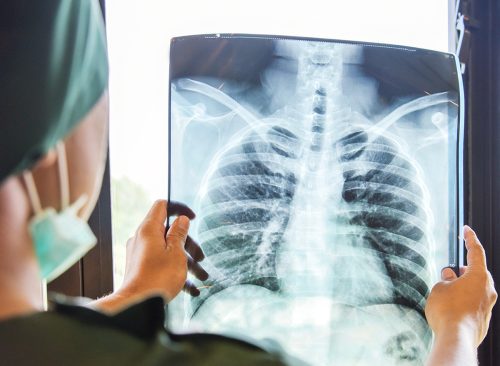
This week, the New York Times published an alarming report that lung cancer rates are rising among younger women while dropping among men—particularly among nonsmokers. About 15% to 20% of lung cancer cases are among women who’ve never smoked. And researchers aren’t sure why; it may be caused by secondhand smoke, or women may metabolize carcinogens differently. Amid the confusion, experts say early detection is still crucial to long-term survival. “We’re seeing the demographics change,” Dr. Jyoti Patel, a thoracic oncologist at Northwestern told the Times. “People shouldn’t ignore symptoms that could lead to lung cancer diagnosis.” Here are the signs you may have lung cancer.

A cough that lasts for longer than six weeks should be evaluated by a doctor, experts say. Coughing that gets worse is also a red flag, according to the Centers for Disease Control and Prevention.

Lung cancer can cause chest pain. It often gets worse with deep breathing, coughing, or laughing, the American Cancer Society says.

Upper back pain can be a sign of lung cancer, Dr. Narjust Florez, a thoracic medical oncologist at the Dana-Farber Cancer Institute, told the New York Times.

“A distressing symptom of lung cancer is shortness of breath, also called dyspnea, which causes you to have difficulty catching your breath or to feel tightness in your chest,” says Johns Hopkins Medicine. “Shortness of breath may come on with physical activity, or even while resting.”

Losing weight without trying can be a symptom of undiagnosed cancer. This occurs because cancer can hijack the metabolism, using the body’s energy stores for its own growth. If you’re dropping pounds without having changed your diet or exercise routine, consult your doctor.

Feeling tired all the time or weak can be a red flag for cancer, including lung cancer. Cancer’s effect on the metabolism can leave you feeling short on energy.

Losing your appetite is also suspicious for many types of cancer, including lung cancer, the ACS says.

A new onset of wheezing should be evaluated by your doctor, as it could be caused by a tumor in the lung, the ACS says.

“Hoarseness is a less-known symptom of lung cancer. It is often caused by an irritation or injury to the vocal cords,” says the Roy Castle Lung Cancer Foundation. You may notice a change in your voice—it might seem raspy, husky, strained, or weak.

Infections that affect the lungs, such as bronchitis or pneumonia, that get worse or keep coming back can be a sign of lung cancer.

In severe cases, coughing up blood may be the first sign of lung cancer. You may also cough up bloody or rust-colored phlegm. But if you’re having other symptoms, don’t wait until that point before asking your doctor whether testing for lung cancer is appropriate. “I have women that have come with chest pressure and leave the office with Xanax,” said Patel. “And then when they start coughing up blood, that’s when somebody listens to them.”














